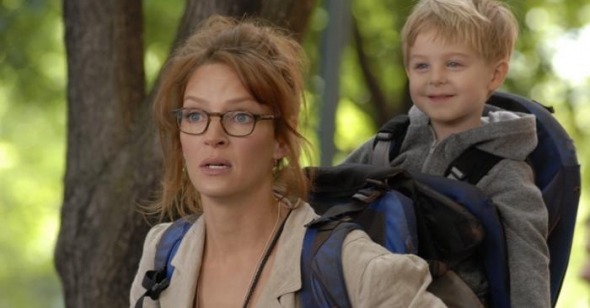A Day in the Life
by Jeff Reichert
Motherhood
Dir. Katherine Dieckmann, U.S., Freestyle Releasing
âWhat Does Motherhood Mean to Me?â wonders Eliza, Uma Thurmanâs harried West Village mother of two, as she works her way through a day of tough city living in Katherine Dieckmannâs Motherhood. Somewhat sadly, this existential pondering doesnât spring organically from the material at hand: an episodic catalogue of indignities visited by the evil urban environment upon those who choose to procreate therein. Instead, our heroine, a creative sort left at witâs end by the mundane distractions of her life, fresh from finishing a quickie post to her mom-blog âThe Bjorn Identity,â is sparked to answer this rather large question by a crude pop-up internet ad announcing a writing contestâ500 words on being a mom could be Elizaâs ticket back into a regular writing gig and the adult workforce.
No sooner has Eliza found opportunity knocking than Dieckmann whip-zooms to a calendar garishly scribbled with a notice about daughter Claraâs impending sixth birthday party, set for later in the day weâre witnessing, the same day as the deadline for the contest, thus setting in motion the filmâs twinned narratives and themes: balance between the needs of children and the needs of the parent. â30 Rockâ episodes often build themselves around such narratively inconvenient confluences sketched out in brief before the showâs madcap credits, only to launch from this sitcomy footing into unimaginable feats of absurdity (Iâd love to see an afternoon with Mama Lemon juggling a baby and an impending TGIS episode sketched out in 22 minutes). Dieckmannâs reliance on the tried-and-true only highlights Motherhoodâs links to convention.
For a movie intended to hum with the rhythms of daily life, Motherhood feels like the product of a tidy and neatly rounded-off screenplay. The level of incident contained in this one afternoon registers as unlikelyânot Elizaâs briskly hoofing from errand to errand so much as the ways in which the script makes room at each stop for her to engage in some sort of confrontation with a city archetype (hippie mom, flamboyant queen, annoying hipster, lesbian baker, soulful brown bike messenger) that leaves her either a near-tears punchline, or huffing, outraged and indignant. (The less said about the particularities of the dialogue, most especially several strained references to 9/11, the better.) It should go without saying that in this kind of construction all the scattered incidents of the day wind their way cleanly toward resolution. Sure, this is how screenplays are supposed to work, but most days just donât work like this.
Dieckmannâs intentions with Motherhood are spot onâI canât think offhand of another film interested in miring itself in the quotidian minutiae of an average momâbut her autobiographical impulses (âwrite what you know,â they say) muddy the waters of identification with Eliza. For instance: Eliza and her husband share two rent-stabilized apartments in the West Villageâone is used for living and one for a studio. This mirrors Dieckmannâs own life. But itâs an unnecessary specificity, one that plays as confusing early on (we see Eliza leave her bed, exit her apartment and enter another to make breakfast) resulting in a terribly awkward explanation later as Eliza argues over her lost parking spot:
Surly Guy in Car: âYou live in the West Village so you can afford to park someplace else.â
Eliza: âYou can say that, but youâd be wrong. My apartment is right there. Rather, I should say, our apartments.â
Surly Guy in Car (incredulous): âYouâve got more than one apartment?â
Eliza: âTheyâre rent-stabilized, and one is a studio.â
What this exchange adds to character or the advancement of the narrative is inexplicable (on a purely structural level, it answers the early spatial ambiguity which could have easily been omitted). But it subtracts further from the generalized sympathy built by the filmâs opening, in which Elizaâs face goes unseen by Dieckmannâs camera as she goes about her everyday morning rituals. Who has two apartments, rent-stabilized or not?
Even if Dieckmann had experienced exactly the day witnessed in Motherhood, itâd still need to be translated for the screen in a relatable fashion; Elizaâs supposedly everywoman travails seem too wedded to a particular class experience. Itâs a fine line to walk, between neutering character and closing off empathy, and Iâm sure audiences everywhere, and yes, especially mothers, will see something of themselves in Eliza, but I wonder about the immersive, realistic, open-ended Motherhood that might have been.
This article originally appeared on indieWIRE.com.
